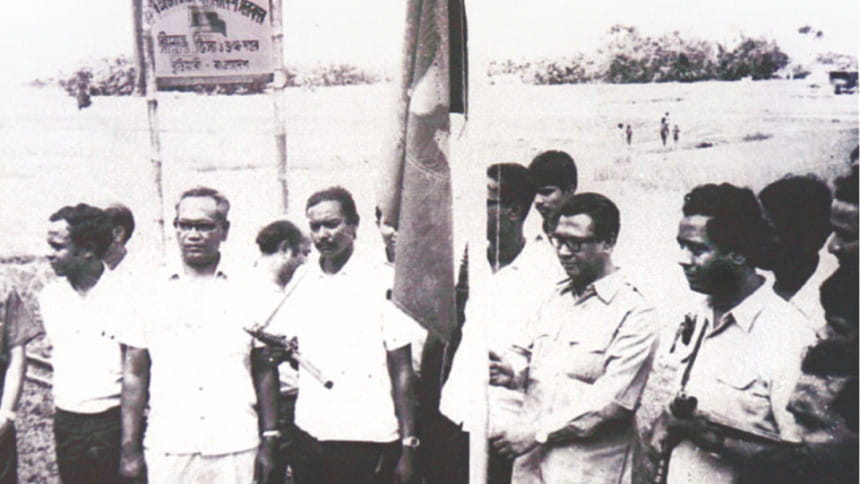Portrait of a leader

Tajuddin Ahmad – the name is synonymous with courageous leadership. Under the leadership of Bangabandhu Sheikh Mujibur Rahman, Tajuddin helmed the Liberation War, guiding the war operations in the absence of the Father of the Nation.
Tajuddin Ahmad was born on July 23, 1925, to a traditional conservative family in the village of Dordoria, which sits 82 km north of Dhaka. He was a star pupil, the centre of attention since his childhood. He served as an inspiration for his friends and compatriots with his dedication to the ideals of freedom and secularism. Even as a young boy, he understood that he could achieve the most good for the people of his nation through politics. And thus, as a teen, he would visit the Muslim League office at Kolta Bazar, where, eventually, even the senior members began to regard him with respect and deference. During one such visit, he declared that Pakistan could never remain united as per Jinnah's expectations. This prophecy made by a school boy was the core political vibe of Awami League in the early seventies.
As he grew into an adult, Tajuddin found himself more and more engrossed with politics, shaping his own political ideology along the way. He studied Economics at the University of Dhaka, a department that was a hotbed of politics. He helped set up a student party - the Pakistan Chhatra League - on January 4, 1948. A year later, when the Awami Muslim League was formed, Tajuddin joined the party, and became an integral part of our nation's history.
At 29, Tajuddin became a member of the Parliament by defeating his heavyweight opponent Fakir Abdul Mannan, then General Secretary of the East Pakistan Muslim League. In the meantime, his personal life was also changing. He got married to Sayeda Zohra Khatun in 1959, but politics gave him little chance to live a family life.
After the death of Hussein Shaheed Suhrawardy in 1963, and under the leadership of Bangabandhu, Tajuddin Ahmad worked to reorganise the Awami League. It was a time when Awami League had lost much of its charm and political ground at the grassroots level. Thus, it was of utmost importance to revive the party once again. The Six-point Programme was formulated during this time, and Tajuddin played a crucial role in formulating the historic demand.
After Bangabandhu's historic speech of March 7, 1971, he became the most popular leader of East Pakistan. Under his guidance, all the administrative directives were issued by Tajuddin Ahmad during the non-cooperation movement from March 7 to 25.
On the terrible night of March 25, 1971, when the Pakistani military went on a killing rampage in Dhaka, Tajuddin Ahmad left for the hideout with Barrister Amirul Islam. Dressed in a lungi, Tajuddin carried only a shirt and a gun with him. On their way to India, they were surprised to see that people from all walks of life were ready and willing to fight for the emancipation of Bangladesh.
Before leaving Dhaka, Tajuddin left a small note to his family, which read, "Bangladesh's war of independence has begun. Join the masses. We will meet again, if we win." Even at this daunting hour, Tajuddin didn't lose his nerve, as he was willing to leave behind his family in the dark, confident that they could fend for themselves, and was ready to sacrifice his life if it meant freedom for his people.
Tajuddin was wise enough to understand, even at that early stage of war, the need for international assistance in an armed struggle to free his country. After his meeting with Indira Gandhi, Tajuddin immediately decided to form a government with the elected members of Parliament. He realised that forming a government was the only way to fight the occupation power and gain international support. The whereabouts of his colleagues were unknown. But he was able to confront the situation by announcing the formation of a government on April 17, 1971. After the new government had taken oath, Prime Minister Tajuddin Ahmad said in a press statement, "We do not aspire to join any bloc or pact but will seek assistance from those who give it in a spirit of goodwill free from any desire to control our destinies."
In his first meeting with Indira Gandhi, he clearly stated that this war was being fought to free Bangladesh from oppression. "This is our war and we want to fight it on our own. We do not expect any interference from the Indian army. But we need training, arms and help for the refugees who have taken shelter in West Bengal," he said.
After the nation gained its independence, when Tajuddin Ahmad returned to the newly free Bangladesh on December 22, the country was in a devastated state. From December 22 to January 10, the socialist in him emerged in every speech he made in public, as he emphasised on the need for secularism, socialism and democracy to build this new nation. He believed that these could be the key pillars in the transformation of the ailing country.
As a Minister of Finance, Tajuddin demonstrated tremendous courage. The government treasury was more or less empty at that time. The foreign exchange reserve was drained by the Pakistani government. Import of essential goods and industrial raw materials had to be resumed without delay before acute shortage developed and local industries were forced to shut down. But he fought against all odds, and by September 1972, Bangladesh's foreign exchange reserve had soared to around US$ 400 million.
It was considered a princely sum and a comfortable foreign reserve. And that is why M Matiul Islam, the then Finance Secretary wrote, "We were, therefore, debating whether to accept the IMF's offer of extending to Bangladesh its short-fall adjustment credit routinely given to a newly emerging developing country to tide over the initial shortfall in its export earnings. Tajuddin quickly ended the debate by deciding to accept the IMF offer which had no strings attached."
"Tajuddin came much before his time and we are not yet ready to understand him properly." Professor Sardar Fazlul Karim's famous words aptly describe the leading figure of Bangladesh's liberation war. In the physical absence of Bangabandhu Sheikh Mujibur Rahman, Tajuddin Ahmad was the key leader, who directed the war with remarkable élan to achieve freedom from the Pakistani colonial occupation. When he was assassinated in prison on November 3, 1975, just a few months after the brutal killing of Bangabandhu and most of his family members, the whole nation mourned the loss of a leader who had so much more to offer, so much left to do for the country that he helped build.
The writer is a journalist of The Daily Star.

 For all latest news, follow The Daily Star's Google News channel.
For all latest news, follow The Daily Star's Google News channel. 



Comments